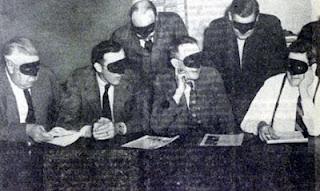I’d never read Laura’s workbefore, but was struck by her powerful, straight-forward, no-nonsense approach in describing how things operate in thousands of church basements across America, whereexpressions like “keep coming back”and “fake it ‘til you make it” aremost often shouted by people that will, in all probability, be doing both thosethings for the rest of their lives. Why? Because the slogan“it works if youwork it” does work if you do work it and thosepeople become recovered, former alcoholics. You won’t find a lot of them hangingaround in AA meetings. Most of them are out in the real world, livingproductive, happy, fulfilled lives these days. Granted, there will be a few inattendance that have found the cure and wish to share their experience withothers. But that type doesn’t stand out much at meetings. In fact, talkingabout a cure for addiction is strictly forbidden in today’s AA, and anyone thatdares to speak that kind of AA blasphemy will likely be told they’re going to “kill”people with that kind of information. The guilty party is usually ridiculed and shunned by the other members, or at least viewed as one donut short of a full dozen.
Is it just me, or doesteaching people that they suffer from an incurable disease seem a bit ludicrous in a program that promotes addictionrecovery as its main message? What gives me the right to challenge today’s viewof addiction as an incurable disease, especially when the American MedicalAssociation, Alcoholics Anonymous, and thousands of treatment professionalsacross America assure us it’s true? Bill Wilson, Dr. Bob and AA’s otherfounders, that’s who. Don’t believe that the word cure is mentioned anywhere in AA’s Big Book? Well, don’ttake my word for it. Open your Big Book, 4th Edition, turn to page191, and have a look for yourself.
Here’s what you’ll find. BillWilson was quoted as saying “Henrietta, the Lord has been so wonderful tome, curing me of this terrible disease, that I just want to keep talking aboutit and telling people.”
That one, single sentence wasthe entire reason Alcoholics Anonymous was founded in the first place.It’s pretty much a complete 360-degree turnaround to today’s AA, wouldn’tyou say? Bill must be rolling in his grave. AA’s whole purpose is to teachstruggling alcoholics how to permanently lose the urge to drink through aspiritual awakening and become recovered alcoholics, not forever recoveringvictims of an incurable disease.
A spiritual awakening is arelatively simple experience to achieve. In fact, 3 of AA’s 12 Steps arewritten as a simple set of instructions that anyone can follow on their own.Simple and easy are not always the same thing, however, which is why so few AAmembers ever experience a spiritual awakening of their own. First, you have toadmit defeat to alcohol and really mean it. Next, you have to believe something called a “Higher Power”exists. Then you have to surrender your own will to that same Higher Power andreally mean it. Then you must askthis invisible eye in the sky to remove the urge to drink and really, really mean it. And you have to ask humbly. (groan) Notreally a big deal, except the entire concept grates against every fiber of thebeing of most addicts. The word “will”refers to one’s wants and needs. Most addicts have never felt the need to ask for God’s help before and don’t want to start asking now. Webster’s Dictionary defineswill as the capability of conscious choice and decision and intention. Most people, addicts and non-addicts alike, clingtightly to their right to choose and decide things for themselves. Surrenderingcontrol to an invisible, superior being seems like a big request. It is a big request.
When AA first began, a personcould only become a sponsor if they had first experienced a spiritual awakeningof their own. Not so in today’s AA. More often than not AA meetings have becomea support group consisting of the blind-leading-the-blind. It’s a place forvictims-in-arms suffering as hopeless victims of an incurable disease gather totell old war stories over and over, day in, day out, for the rest of theirlives. People talk the talk, memorize the Big Book from back to front, yetcompletely ignore the simple spiritual message found on page 191. Not only domany of these people ignore the message, but become downright aggressive whenanyone dares to question the incurable disease myth. Why? Because those samepeople are well aware of AA’s original message, but have never done the workrequired to find their own spiritual cure. Rather ironic how so many of thosesame diehard defenders of a recovery program they claim saved their lives notonly refuse to embrace the founding father’s cure message, but also labelanyone that does choose to promote the truth as a murderer. A little tooironic, don’t you think?

People like Laura Tompkins,myself, and many other AA critics are not out to destroy Alcoholics Anonymous.We are simply trying to save it from self-destruction by pointing out itscurrent failings and doing our best to help a once proud organization return toits original message, which is that the urge to drink can be permanentlyremoved using a spiritual approach. A spiritual healing is just one of manyapproaches to overcoming addiction, of course. There are many others, as well,and all lead to the same place – a fully recovered life, free ofaddiction.
You can learn more aboutLaura Tompkins here http://www.huffingtonpost.com/laura-tompkins/alcoholics-anonymous_b_1383849.html
You can learn more about Danand his 3 Steps method of beating addiction here http://www.3stepstorecovery.com/
I’d love to hear yourcomments. You can email me at [email protected]and I will gladly reply to your questions.
